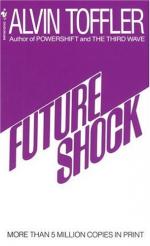
|
Chapters 1-2
• Future shock is the disorientation in which new technologies and behaviors change the cues that orient people's sense of identity and place.
• As the rate of change accelerates, there is more and more information to keep up with, and this accelerative thrust puts enormous pressure on people to keep up or be left behind.
Chapter 3-4
• Durational expectancies have changed, so that people have to adjust to an accelerating pace of life and of change.
• The economics of transience makes it easier for companies to produce a lot of cheap things than to produce well-made things that are more expensive and last longer.
Chapter 5
• Super-industrialism allows people to commute long distances to where they work, diminishing their relationship with place.
• Automobiles provide an unprecedented degree of personal freedom and mobility.
Chapter 6
• Modular men have shallow relationships with people, primarily based on their roles and functions
• Deeper...
|
This section contains 568 words (approx. 2 pages at 300 words per page) |

|




